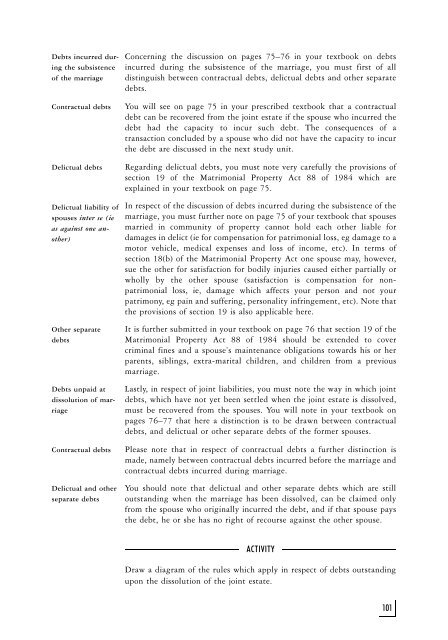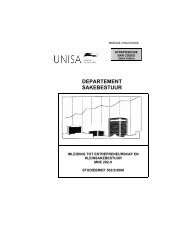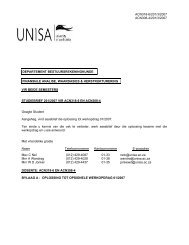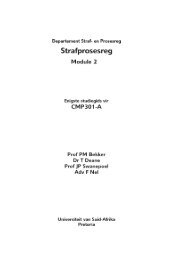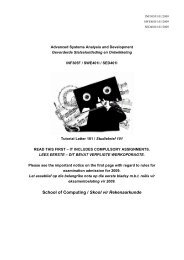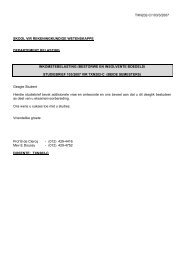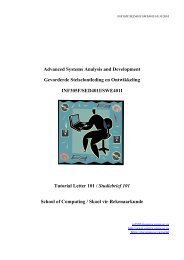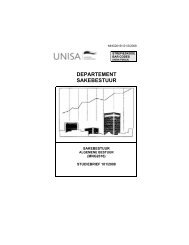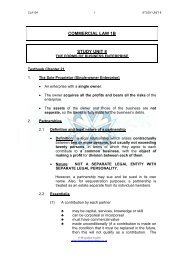key to the study guide - Name
key to the study guide - Name
key to the study guide - Name
Create successful ePaper yourself
Turn your PDF publications into a flip-book with our unique Google optimized e-Paper software.
Debts incurred during<br />
<strong>the</strong> subsistence<br />
of <strong>the</strong> marriage<br />
Concerning <strong>the</strong> discussion on pages 75±76 in your textbook on debts<br />
incurred during <strong>the</strong> subsistence of <strong>the</strong> marriage, you must first of all<br />
distinguish between contractual debts, delictual debts and o<strong>the</strong>r separate<br />
debts.<br />
Contractual debts You will see on page 75 in your prescribed textbook that a contractual<br />
debt can be recovered from <strong>the</strong> joint estate if <strong>the</strong> spouse who incurred <strong>the</strong><br />
debt had <strong>the</strong> capacity <strong>to</strong> incur such debt. The consequences of a<br />
transaction concluded by a spouse who did not have <strong>the</strong> capacity <strong>to</strong> incur<br />
<strong>the</strong> debt are discussed in <strong>the</strong> next <strong>study</strong> unit.<br />
Delictual debts Regarding delictual debts, you must note very carefully <strong>the</strong> provisions of<br />
section 19 of <strong>the</strong> Matrimonial Property Act 88 of 1984 which are<br />
explained in your textbook on page 75.<br />
Delictual liability of<br />
spouses inter se (ie<br />
as against one ano<strong>the</strong>r)<br />
O<strong>the</strong>r separate<br />
debts<br />
Debts unpaid at<br />
dissolution of marriage<br />
In respect of <strong>the</strong> discussion of debts incurred during <strong>the</strong> subsistence of <strong>the</strong><br />
marriage, you must fur<strong>the</strong>r note on page 75 of your textbook that spouses<br />
married in community of property cannot hold each o<strong>the</strong>r liable for<br />
damages in delict (ie for compensation for patrimonial loss, eg damage <strong>to</strong> a<br />
mo<strong>to</strong>r vehicle, medical expenses and loss of income, etc). In terms of<br />
section 18(b) of <strong>the</strong> Matrimonial Property Act one spouse may, however,<br />
sue <strong>the</strong> o<strong>the</strong>r for satisfaction for bodily injuries caused ei<strong>the</strong>r partially or<br />
wholly by <strong>the</strong> o<strong>the</strong>r spouse (satisfaction is compensation for nonpatrimonial<br />
loss, ie, damage which affects your person and not your<br />
patrimony, eg pain and suffering, personality infringement, etc). Note that<br />
<strong>the</strong> provisions of section 19 is also applicable here.<br />
It is fur<strong>the</strong>r submitted in your textbook on page 76 that section 19 of <strong>the</strong><br />
Matrimonial Property Act 88 of 1984 should be extended <strong>to</strong> cover<br />
criminal fines and a spouse's maintenance obligations <strong>to</strong>wards his or her<br />
parents, siblings, extra-marital children, and children from a previous<br />
marriage.<br />
Lastly, in respect of joint liabilities, you must note <strong>the</strong> way in which joint<br />
debts, which have not yet been settled when <strong>the</strong> joint estate is dissolved,<br />
must be recovered from <strong>the</strong> spouses. You will note in your textbook on<br />
pages 76±77 that here a distinction is <strong>to</strong> be drawn between contractual<br />
debts, and delictual or o<strong>the</strong>r separate debts of <strong>the</strong> former spouses.<br />
Contractual debts Please note that in respect of contractual debts a fur<strong>the</strong>r distinction is<br />
made, namely between contractual debts incurred before <strong>the</strong> marriage and<br />
contractual debts incurred during marriage.<br />
Delictual and o<strong>the</strong>r<br />
separate debts<br />
You should note that delictual and o<strong>the</strong>r separate debts which are still<br />
outstanding when <strong>the</strong> marriage has been dissolved, can be claimed only<br />
from <strong>the</strong> spouse who originally incurred <strong>the</strong> debt, and if that spouse pays<br />
<strong>the</strong> debt, he or she has no right of recourse against <strong>the</strong> o<strong>the</strong>r spouse.<br />
ACTIVITY<br />
Draw a diagram of <strong>the</strong> rules which apply in respect of debts outstanding<br />
upon <strong>the</strong> dissolution of <strong>the</strong> joint estate.<br />
101


